Ukrainian-German expert talks on constitutional law and process
On October 16-17, 2018 the 7th Ukrainian-German expert talks on constitutional law and process took place in the Constitutional Court of Ukraine. The event was organised by the Constitutional Court of Ukraine in co-operation with the German Foundation for International Legal Cooperation (IRZ).

The meeting was attended by the Chairman and the judges of the Constitutional Court of Ukraine, judges' research consultants, employees of the Secretariat of the Court, German experts on constitutional law - former judge of the Federal Constitutional Court of Germany, Professor, Dr. Udo Steiner, former President of the Land Constitutional Court of Saxony-Anhalt Winfried Schubert, researcher at the Max Planck Institute for Comparative Public Law and International Law Dr. Matthias Hartwig, IRZ Senior Project Manager Wolfram Hertig and IRZ legal advisor Gennadii Ryzhkov.
The event was moderated by the judge of the Constitutional Court of Ukraine Ihor Slidenko and the Head of the Secretariat of the Court Yaroslav Vasylkevych.
The program of the meeting included expert talks on issues related to the processing of constitutional complaints in the Secretariat of the Court, the enforcement of the decisions of the Constitutional Court of Ukraine, the practical activity of the body of constitutional control in preparation and adoption of the decisions, as well as the correlation between the jurisprudences of the constitutional courts and the European Court of Human Rights.
 Doctor of Legal Sciences, Professor, Corresponding Member of the National Academy of Legal Sciences of Ukraine, Chairman of the Constitutional Court of Ukraine Stanislav Shevchuk delivered a welcome address to the participants of the event. The Court Chairman noted that it was on October 16th that the Constitutional Court of Ukraine celebrated the 22nd anniversary of its activities. "I would like to congratulate our colleagues on a significant event and wish success in further strengthening of constitutional principles and values," he stressed. Stanislav Shevchuk expressed his sincere gratitude to IRZ Foundation, with the assistance of which the Ukrainian-German expert talks on constitutional and legal issues have been regularly held.
Doctor of Legal Sciences, Professor, Corresponding Member of the National Academy of Legal Sciences of Ukraine, Chairman of the Constitutional Court of Ukraine Stanislav Shevchuk delivered a welcome address to the participants of the event. The Court Chairman noted that it was on October 16th that the Constitutional Court of Ukraine celebrated the 22nd anniversary of its activities. "I would like to congratulate our colleagues on a significant event and wish success in further strengthening of constitutional principles and values," he stressed. Stanislav Shevchuk expressed his sincere gratitude to IRZ Foundation, with the assistance of which the Ukrainian-German expert talks on constitutional and legal issues have been regularly held.
The Chairman of the Court emphasised the relevance of the chosen topic, devoted to the issues of constitutional law and process, in particular, the functioning of the constitutional complaint institute. The Chairman of the Court stressed that with the introduction of such an important institute, a person was able to directly appeal to the Constitutional Court of Ukraine in order to protect his/her constitutional rights violated by law. He provided statistical data on constitutional complaints and their processing in the Court, noting that the first experience of consideration of constitutional complaints indicates a lack of understanding of the nature of this institute.
"Expert talks of Ukraine's implementation of the constitutional complaint institute, ensuring enforcement of the decisions of the Constitutional Court of Ukraine, in particular with regard to constitutional complaints, is due to the need for a thorough study of the world's experience in the functioning of this institute, in particular in Germany," said the Chairman of the Court. Emphasising the importance of international cooperation, Stanislav Shevchuk also pointed out that the Constitutional Court of Ukraine in its decisions had formulated the principle of "friendly treatment" to the norms of international law, according to which the Court takes into account the requirements of the current international treaties and the practice of interpreting these treaties by international bodies, which jurisdiction Ukraine had already recognised.
Stanislav Shevchuk wished the participants fruitful work and noted that a the moment the Constitutional Court of Ukraine in the process of considering constitutional complaints is at the beginning of its journey, which increases the need for a professional discussion of this issue.
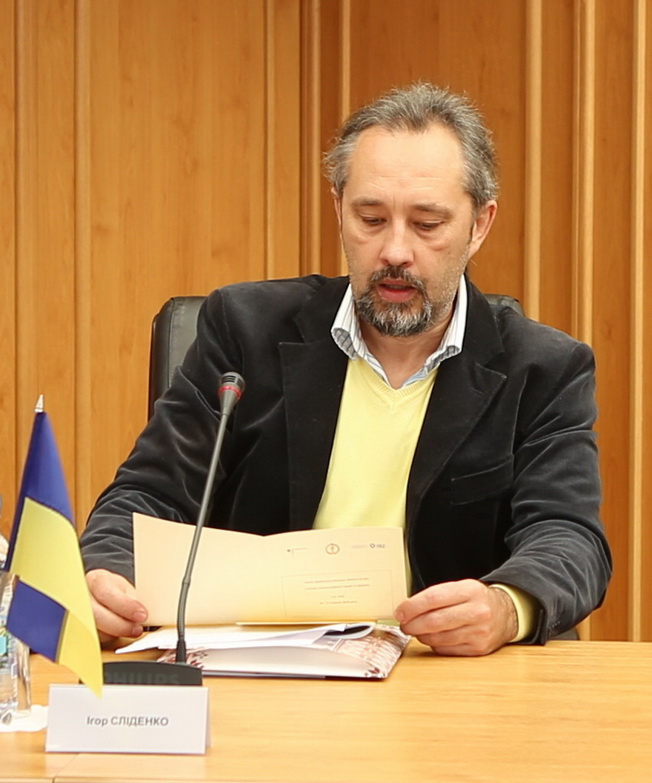 Judge of the Constitutional Court of Ukraine, Doctor of Legal Sciences Ihor Slidenko thanked the German guests for participating in expert talks on the implementation of the constitutional complaint institute in Ukraine.
Judge of the Constitutional Court of Ukraine, Doctor of Legal Sciences Ihor Slidenko thanked the German guests for participating in expert talks on the implementation of the constitutional complaint institute in Ukraine.
The judge noted that the changes that took place in the legal system of Ukraine two years ago as a result of the constitutional reform, when the institute of constitutional complaint was implemented, and the powers of the Court were changed, produced new challenges to the Constitutional Court of Ukraine, requiring qualitative and expert talks of those problems that had not been met before in the legal system of Ukraine.
Ihor Slidenko stressed that the assistance of German experts is particularly valuable for the Court, since the experience of the Federal Constitutional Court of Germany on the implementation of the constitutional complaint institute, is today complete and of high quality. He wished the participants of the event professional answers to the difficult issues facing the Constitutional Court of Ukraine nowadays.
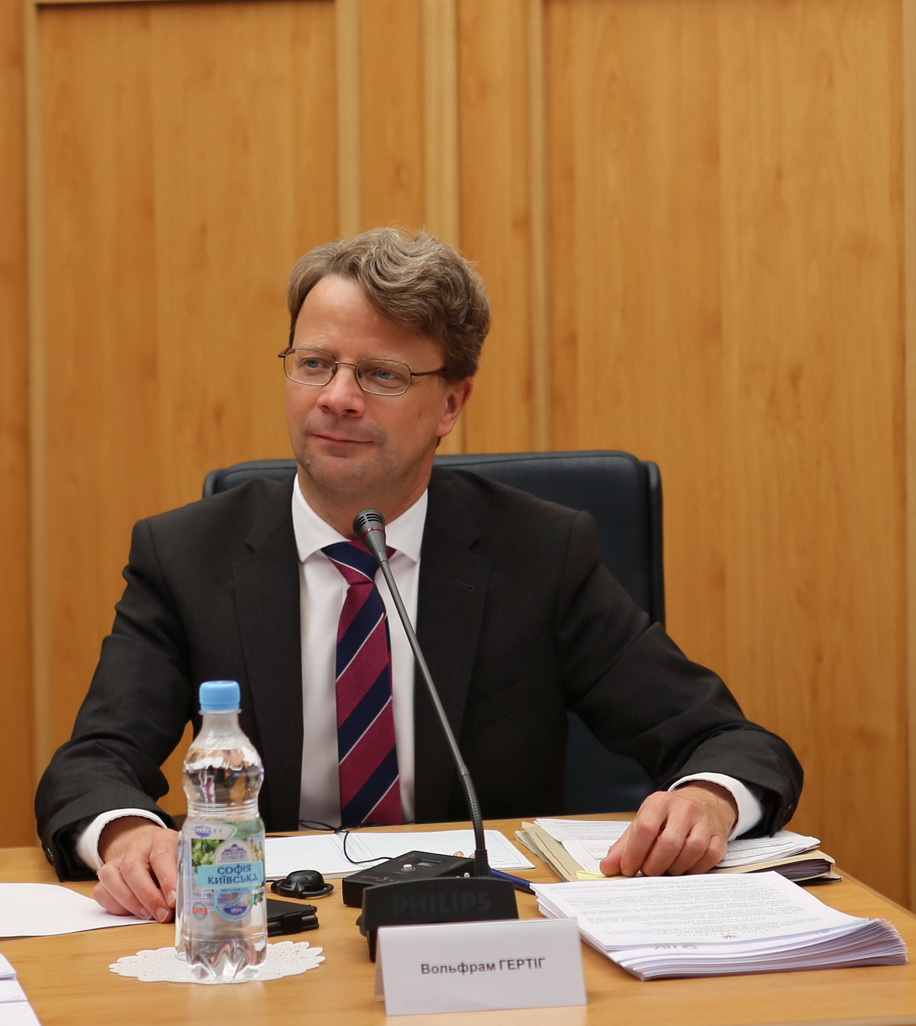 IRZ Senior Project Manager Wolfram Herthig congratulated the Chairman, judges and employees of the Secretariat of the Constitutional Court of Ukraine on the 22nd anniversary of its activities and wished great success in further activity.
IRZ Senior Project Manager Wolfram Herthig congratulated the Chairman, judges and employees of the Secretariat of the Constitutional Court of Ukraine on the 22nd anniversary of its activities and wished great success in further activity.
The speaker noted that cooperation between IRZ and the Constitutional Court of Ukraine had lasted for more than 20 years and emphasised the importance of exchanging legal experience in the format of expert talks between the constitutional jurisdictions.
Wolfram Hertig noted that international experts are watching with great interest all the processes related to the implementation of reforms in Ukraine, in particular, the constitutional reform and the introduction of a constitutional complaint institute, which are extremely necessary for a law-based state. He stressed the importance of the issues, presented for discussion, and wished a fruitful discussion.
 Yaroslav Vasylkevych, Head of the Secretariat of the Constitutional Court of Ukraine, told about the functioning of the institute of a constitutional complaint introduced in Ukraine in order to ensure effective protection of human rights violated because of the application of those provisions of the law of Ukraine, which contradict the fundamental constitutional fundamentals and principles. The speaker presented infographics regarding the receipt of constitutional complaints before the Court and their processing by the Secretariat of the Court to the participants of the event.
Yaroslav Vasylkevych, Head of the Secretariat of the Constitutional Court of Ukraine, told about the functioning of the institute of a constitutional complaint introduced in Ukraine in order to ensure effective protection of human rights violated because of the application of those provisions of the law of Ukraine, which contradict the fundamental constitutional fundamentals and principles. The speaker presented infographics regarding the receipt of constitutional complaints before the Court and their processing by the Secretariat of the Court to the participants of the event.
During the presentation, the Head of the Court's Secretariat dwelt upon the structure of the constitutional control body, the stages of consideration of constitutional complaints before the Court, subjects of the right to constitutional complaint, and emphasised the compliance of complaints with the requirements of the law in the form and issues most often raised in the complaint.
It was noted that the stages of consideration of a constitutional complaint include: lodging such a complaint with the Constitutional Court; its preliminary examination by the Secretariat of the Court as to compliance in the form with the requirements of the law; determination of the judge-rapporteur in the case; the study of the constitutional complaint by the judge-rapporteur, which conforms in the form to the requirements of the law, and the preparation of such materials for consideration by the Board; consideration at the Board and delivering of the ruling of the Board of judges on the initiation of the constitutional proceedings or the refusal to initiate them; consideration of the case by the Senate; provision of the decision.
Speaking about the requirements in the form of a constitutional complaint, Yaroslav Vasylkevych emphasised the importance, in particular, of substantiating allegations of unconstitutionality of the law of Ukraine (its respective provisions), indicating which human rights, guaranteed by the Constitution of Ukraine, to the opinion of the subject to constitutional complaint, were violated due to the application of the law. It is such a requirement determined by the law that is most often not adhered to by the applicant, he stressed.
In addition, according to the Head of the Secretariat of the Court, lots of the constitutional complaints were returned to the applicants in view of the fact that the subjects raised the issues that could not be the subject of constitutional complaint, in particular, regarding disagreement and appeal of court decisions in the system of judicial system of Ukraine; actions of bodies and their officials; compliance of by-laws, provisions of legislative acts, which were not applied in the final judicial decision in the case, with the requirements of the Fundamental Law of Ukraine.
Yaroslav Vasylkevych emphasised that the return by the Secretariat of the Court of a constitutional complaint, which in its form does not meet the requirements of the Law, does not prevent repeat lodging with the Court, but rather contributes to the distribution of such a complaint to the judge-rapporteur and its consideration after eliminating the said mistakes. Judge-rapporteur in the case is determined by distributing applications among judges in turn, in alphabetical order, by the date of receipt and the registration number irrespective of the form of application, he summed up.
During the first part of expert talks, there were discussed many issues, in particular, on the relationship between the principle of "the right to a lawful judge" and the processing of constitutional complaints lodged with the Court in the Secretariat of the Court with a possible return on grounds of non-compliance with the requirements regarding form and content; the criteria of "obviously ill-founded" constitutional complaint; the practical implementation of the norm of the Law on Federal Constitutional Court of Germany on abuse of the right to appeal with a constitutional complaint, etc.
 According to the former President of the Land Constitutional Court of Saxony-Anhalt Winfried Schubert, the constitutional complaint institute in Germany is enshrined at the constitutional level, and the Federal Constitutional Court is authorised to consider constitutional complaints that can be lodged by any person who believes that the state authority has violated one of his/her fundamental rights guaranteed by German Constitution, or one of the rights that is equivalent to fundamental rights.
According to the former President of the Land Constitutional Court of Saxony-Anhalt Winfried Schubert, the constitutional complaint institute in Germany is enshrined at the constitutional level, and the Federal Constitutional Court is authorised to consider constitutional complaints that can be lodged by any person who believes that the state authority has violated one of his/her fundamental rights guaranteed by German Constitution, or one of the rights that is equivalent to fundamental rights.
The expert noted that individuals - citizens of Germany, have the right to lodge a constitutional complaint on any fundamental right; foreigners and stateless persons may lodge such a complaint regarding the rights recognised by German Constitution for them. According to the speaker, legal entities also belong to the subjects of the right to a constitutional complaint, if the violated rights of the latter can be attributed to the fundamental ones, that is, those protected by the Fundamental Law. He also added that the disputed right, as well as the acts, actions or omissions of the body or institution, which caused the damage to the applicant, should be determined in the grounds of the complaint.
Continuing his speech, Winfried Schubert pointed out that the hearing on constitutional complaints was free, but at the same time, he emphasised that the Court could impose a fine (up to 2,600 euros) for abuse of the right to lodge a constitutional complaint. The speaker said that in 2017 the corresponding fine was imposed 13 times.
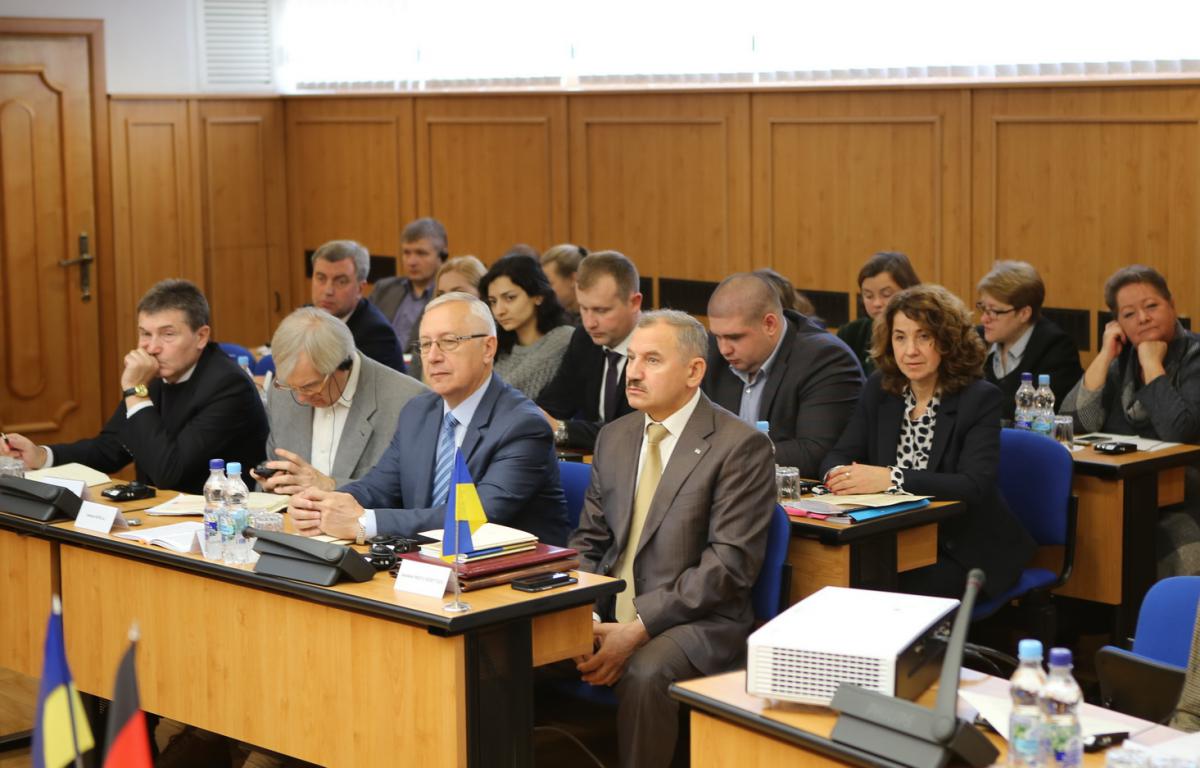 In addition, Winfried Schubert focused on statistics concerning number of constitutional complaints lodged with the Court and the refusal to initiate proceedings in cases. Thus, according to him, from the almost 6,000 complaints 5,748 (about 86%) were recognised inadmissible and about 20% of the complaints was decided on. The issue of admissibility and the establishment of certain "filters", according to the expert, is important, as it helps to cope with the huge number of complaints lodged with the Court.
In addition, Winfried Schubert focused on statistics concerning number of constitutional complaints lodged with the Court and the refusal to initiate proceedings in cases. Thus, according to him, from the almost 6,000 complaints 5,748 (about 86%) were recognised inadmissible and about 20% of the complaints was decided on. The issue of admissibility and the establishment of certain "filters", according to the expert, is important, as it helps to cope with the huge number of complaints lodged with the Court.
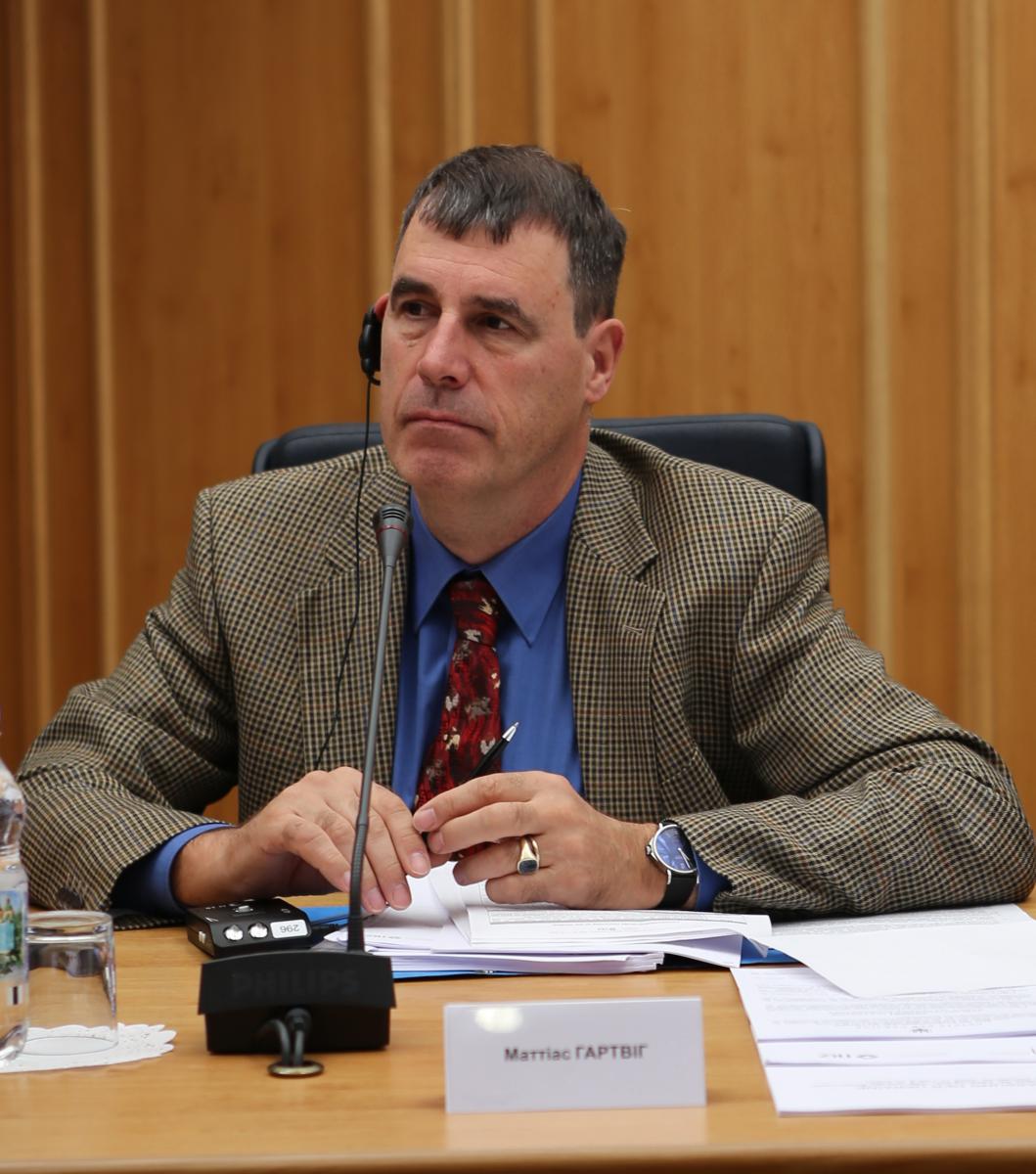 During expert talks, a researcher at the Max Planck Institute for the Study of Foreign Public Law and International Law, Dr. Matthias Hartwig noted that Germany has strict requirements for substantiating the constitutional complaint and the terms for its lodging. Thus, constitutional complaints must be lodged within one month after the final judgment has been passed. During this period, in his words, the applicant must provide a full substantiation, as well as all the necessary documents. If the information to be provided in accordance with the minimum requirements for substantiating the constitutional complaint is lodged after the expiration of the term, the constitutional complaint remains inadmissible, he added. At the same time, according to him, a complaint can be accepted in case if the time limit was not passed by the applicant. In this case, the reasons for missing the lodging period should be noted and duly confirmed.
During expert talks, a researcher at the Max Planck Institute for the Study of Foreign Public Law and International Law, Dr. Matthias Hartwig noted that Germany has strict requirements for substantiating the constitutional complaint and the terms for its lodging. Thus, constitutional complaints must be lodged within one month after the final judgment has been passed. During this period, in his words, the applicant must provide a full substantiation, as well as all the necessary documents. If the information to be provided in accordance with the minimum requirements for substantiating the constitutional complaint is lodged after the expiration of the term, the constitutional complaint remains inadmissible, he added. At the same time, according to him, a complaint can be accepted in case if the time limit was not passed by the applicant. In this case, the reasons for missing the lodging period should be noted and duly confirmed.
The speaker also highlighted that a constitutional complaint is admissible only if all legal remedies have been exhausted. In addition, all other available options should be applied to correct or prevent an appeal against the violation of the Constitution, the so-called subsidiarity of the constitutional complaint. In a constitutional complaint, a person must substantiate a direct relation between acts of state power and violation of his/her rights.
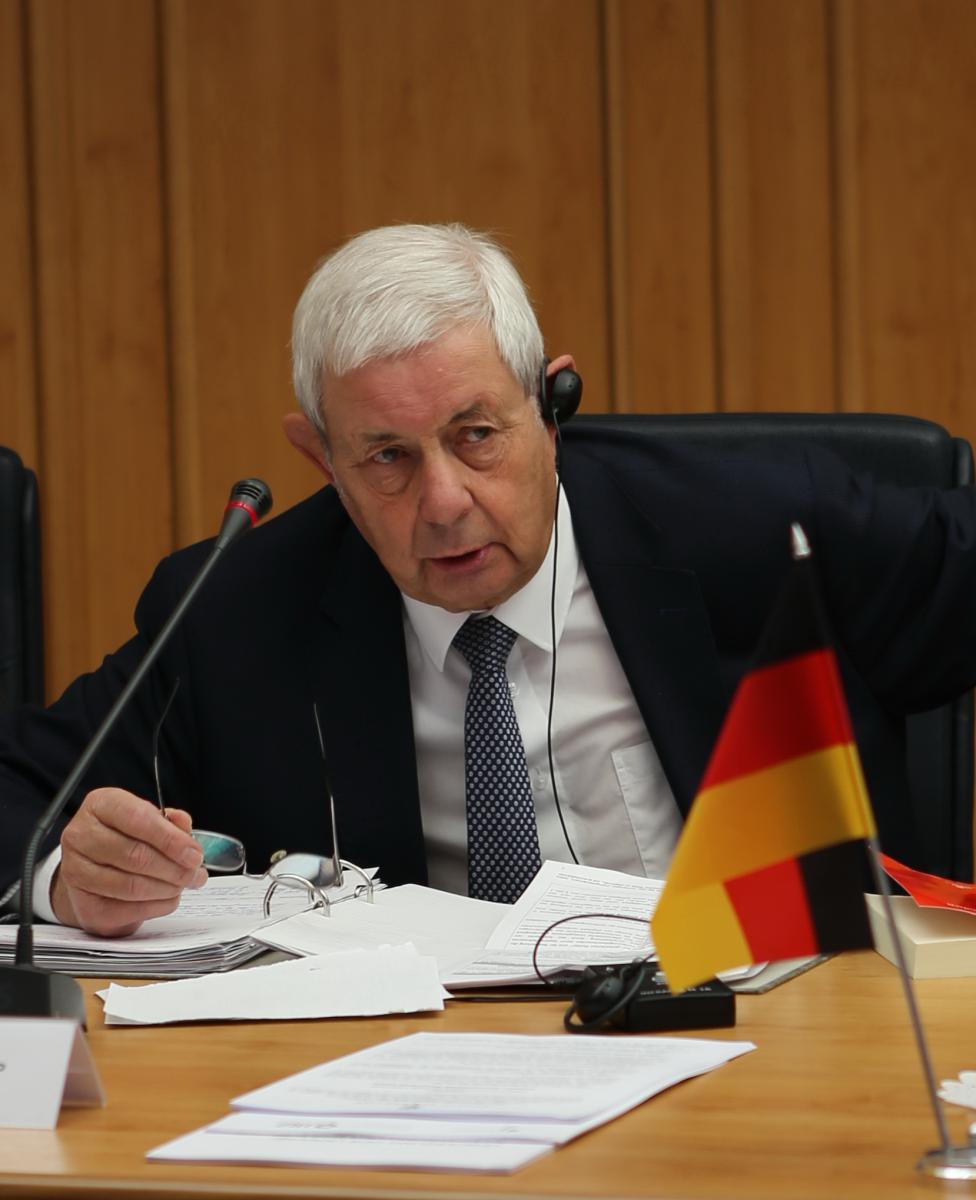 Within the framework of the debate, former judge of the Federal Constitutional Court of Germany, Professor Dr. Udo Steiner noted that if the Court considers the consideration of the complaint to be of public importance, the Court may allow it to be considered, despite the inaccuracy in the substantiation.
Within the framework of the debate, former judge of the Federal Constitutional Court of Germany, Professor Dr. Udo Steiner noted that if the Court considers the consideration of the complaint to be of public importance, the Court may allow it to be considered, despite the inaccuracy in the substantiation.
The second part of the event, during which the issues of ensuring the enforcement of the decisions of constitutional court and the mechanisms for monitoring their enforcement were discussed, in particular, in cases of constitutional complaints, was opened by the contribution of Udo Steiner. The speaker said that in Germany there are no special methods for the enforcement of the decisions of constitutional courts. However, he added, in Germany there are no problems with the enforcement of decisions of bodies of constitutional jurisdiction. "In most cases, decisions of the constitutional courts are carried out qualitatively and in a timely manner," the speaker stressed. According to him, legal consciousness is at the level of all legal institutions.
Udo Steiner noted that German media play an important role in controlling the enforcement of acts of the Constitutional Court. "The media is a "military battalion" of the constitutional control body of Germany," said the speaker. In this context, the speaker highlighted the importance of holding public hearings, in particular, on resonant cases before the Court. Thus, he added, the public through the media is able to get complete information.
Former judge of the Federal Constitutional Court of Germany stressed that German society today trusts constitutional courts. According to him, the Court has high authority, and the integrity of judges is beyond question. According to Udo Steiner, it is precisely such guarantees as high salary, regular rotation (the judge is appointed for a single 12-year term), adherence to judicial ethics and minimisation of political influence makes the German constitutional jurisdiction independent and raises confidence in it. The body of constitutional control of the country should feel protected, he stressed. The scholar also noted that the decisions of the Court should be well-substantiated and speak for themselves, therefore the Federal Constitutional Court of Germany lacked the practice of commenting on the decisions.
The former President of the Land Constitutional Court of Saxony-Anhalt Winfried Schubert said that 81% of the population of Germany trust constitutional courts. The decisions of the Constitutional Court, he said, are well perceived by society. The speaker stressed that crisis situations occurred from time to time in the history of Germany, however, he added, the body of constitutional control of the country should professionally carry out its duties in any situation. "The Constitutional Court must always remain the flagship of the country's judicial system," the constitutionalist emphasised.
The speaker stressed that it was the institute of the constitutional complaint bringing constitutional courts closer to person. Today, he added, citizens of Germany perceive the Federal Constitutional Court of Germany as a court that can protect a specific constitutional right of a person. According to Winfried Schubert, high-quality substantiation of the Court's acts plays a pivotal role in raising the public's confidence in the Court. "It is important to show the public that decisions are provided without a political context," he concluded.
The issue of practical work of the Constitutional Court in the preparation and decision-making process, as well as the order of requesting the briefs of experts/expert institutions by the Constitutional Court, were discussed during the final part of the meeting. The exchange of experience, important ideas and opinions, became the logical conclusion of the first day of the 7th Ukrainian-German expert talks on constitutional law and process.
The second day of Ukrainian-German expert talks on constitutional law and process began with a discussion of the correlation between the jurisprudence of the constitutional courts and that of the European Court of Human Rights.
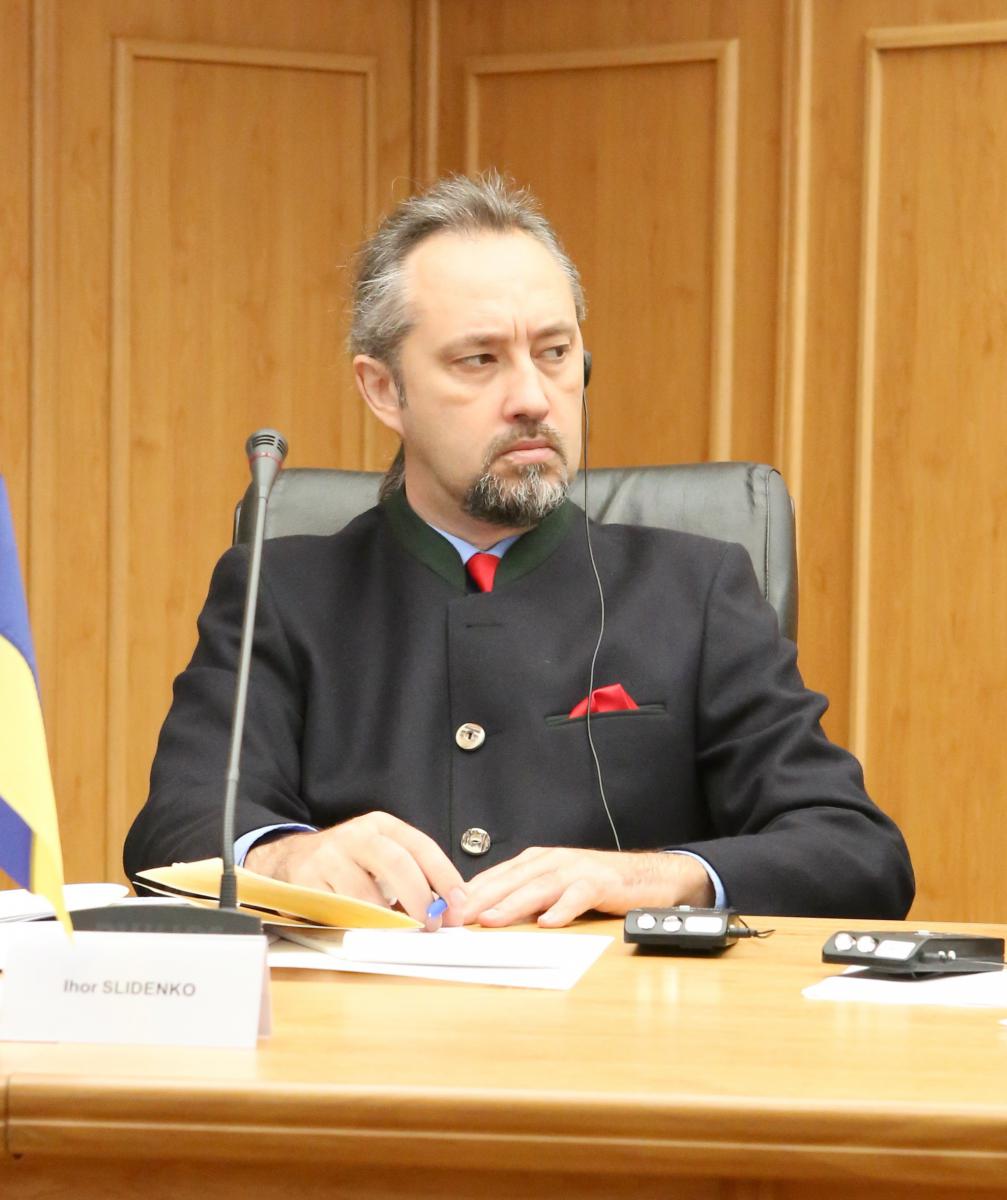 Judge of the Constitutional Court of Ukraine Ihor Slidenko, addressing to the participants of the event, noted that after the adoption of the Law of Ukraine on the Constitutional Court of Ukraine approaches to the correlation and interaction of international and national law have changed. In his opinion, the Constitutional Court of Ukraine should take into account the ECHR’s stare decisis, since after the introduction of the constitutional complaint the Court is called on, to a certain extent, to transfer the resolution of the issues of restoration of violated human rights from the international to the national level.
Judge of the Constitutional Court of Ukraine Ihor Slidenko, addressing to the participants of the event, noted that after the adoption of the Law of Ukraine on the Constitutional Court of Ukraine approaches to the correlation and interaction of international and national law have changed. In his opinion, the Constitutional Court of Ukraine should take into account the ECHR’s stare decisis, since after the introduction of the constitutional complaint the Court is called on, to a certain extent, to transfer the resolution of the issues of restoration of violated human rights from the international to the national level.
A researcher at the Max Planck Institute for the Study of Foreign Public Law and International Law, Dr. Matthias Hartwig, told about the difference between the approaches of the ECHR and the constitutional courts of Ukraine and Germany to the application of Article 6 of the Convention for the Protection of Human Rights and Fundamental Freedoms, as well as the place of the Convention in the German legal system. The expert stressed that the place of the Convention in the national legal systems is determined by two factors: the nature of the Convention itself and the constitutional system of the country concerned.
According to Matthias Hartwig, the place of the Convention in the national legal systems varies. For example, he said, in Austria, the Convention has the status of a Constitution, and therefore the rules of the Constitution have the same legal force as the norms of the Convention. At the same time, ratified international treaties in Turkey have an advantage over the norms of national legislation. As for Germany, the speaker noted, the Convention is applied at the level of ordinary law. At the same time, he noted that Ukraine has a similar approach, and therefore the rules of the Convention are applied in the same way as the ordinary law. "The Convention for the Protection of Human Rights and Fundamental Freedoms is not always in line with national constitutions, so in the case of Germany and Ukraine, national rules will prevail," the expert said.
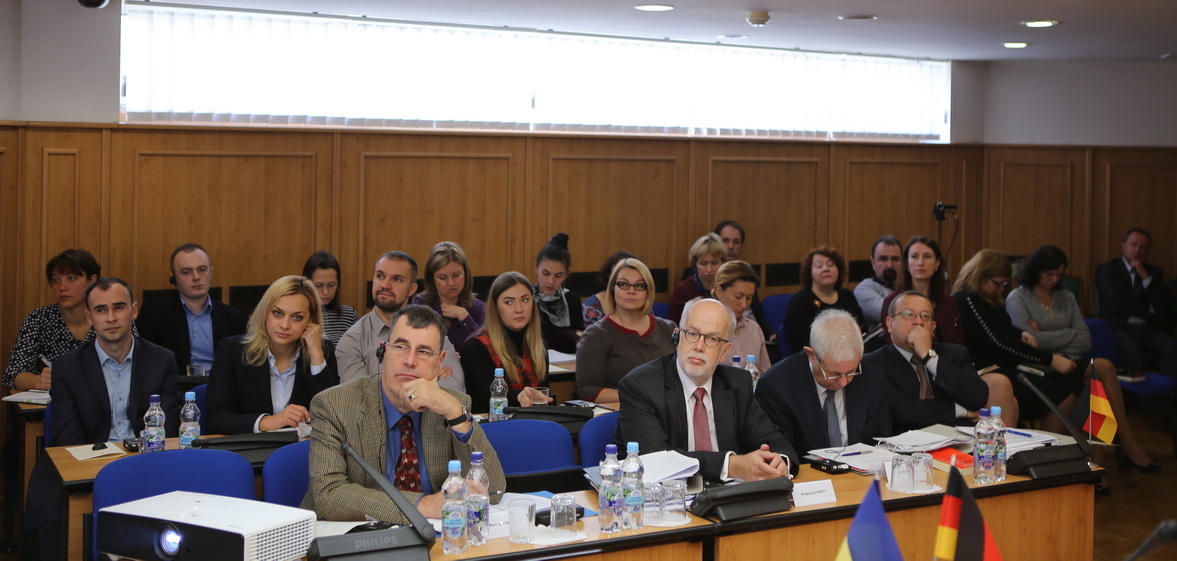 In his report, he also noted that for a long time in Germany the Convention did not play an important role. According to Matthias Hartwig, jurisprudence has contributed to enhancing the role of the Convention and the case-law of the ECHR in the German legal system. As an example, he cited the decision of the Federal Constitutional Court of Germany, in which the Court indicated that the German courts were obliged to take into account the provisions of the Convention and to take into account the case-law of the ECHR. "If the position of the ECHR in a similar case has not been taken into account in the German court decision, this may well be the reason for a person to lodge a constitutional complaint with the Federal Constitutional Court of Germany. The same applies to the application of the rules of the Convention," said Matthias Hartwig. Thus, in his words, the Court developed its own dogma, which had strengthened the role of the Convention and the ECHR judgments.
In his report, he also noted that for a long time in Germany the Convention did not play an important role. According to Matthias Hartwig, jurisprudence has contributed to enhancing the role of the Convention and the case-law of the ECHR in the German legal system. As an example, he cited the decision of the Federal Constitutional Court of Germany, in which the Court indicated that the German courts were obliged to take into account the provisions of the Convention and to take into account the case-law of the ECHR. "If the position of the ECHR in a similar case has not been taken into account in the German court decision, this may well be the reason for a person to lodge a constitutional complaint with the Federal Constitutional Court of Germany. The same applies to the application of the rules of the Convention," said Matthias Hartwig. Thus, in his words, the Court developed its own dogma, which had strengthened the role of the Convention and the ECHR judgments.
The speaker specifically spoke about the application of Article 6 of the Convention for the Protection of Human Rights and Fundamental Freedoms (the right to a fair trial). "The Constitution of Germany does not have the same norm, while at the same time the applicants lodge the largest number of constitutional complaints with the Federal Constitutional Court of Germany on the violation of this right ", said the expert.
To sum up, Matthias Hartwig emphasised that the ECHR judgments against Germany are not often adopted, but they help to improve the national legal system of Germany. He drew attention of those present to the fact that the ECHR cannot cancel the decisions of the domestic courts, but merely concludes that they are not in conformity with the Convention. Further steps, he added, should be made by the national legal system. He noted that the ECHR had adopted a large number of judgments against Ukraine, and expressed the hope that the introduction of a constitutional complaint institute in Ukraine would resolve a number of problematic issues.
Former President of the Land Constitutional Court of Saxony-Anhalt Winfried Schubert continued the discussion on the aforementioned topics. In his speech, he analysed in detail the approaches of the German courts to the application of the Convention for the Protection of Human Rights and Fundamental Freedoms and the case-law of the European Court of Human Rights.
Winfried Schubert expressed his conviction that when providing decisions, each judge should take into account their legal consequences. "Society does not like all the decisions of constitutional courts, but they still have to be executed", summed up the speaker.
The former judge of the Federal Constitutional Court of Germany, Professor, Dr. Udo Steiner, said that the ECHR case-law imposes certain obligations on Germany, in particular when considering constitutional complaints. The judge also drew attention to the risks associated with the introduction of this mechanism. He noted that one of such risks is the possibility of a conflict between the constitutional courts and specialised courts. Also, the expert added, in case of failure to take into account the case-law of the ECHR, the applicant, after receiving a decision on a constitutional complaint, which he/she did not like, may, after addressing the ECHR, obtain an opinion on the non-compliance of such a decision with the Convention for the Protection of Human Rights and Fundamental Freedoms.
Udo Steiner noted that the German constitutional control bodies have a practice of postponing the lapse of the law, which was declared unconstitutional. "This is the toolkit that avoids chaos after recognising the law as unconstitutional," he added. In addition, according to him, the procedure for its enforcement may be determined in the decision itself.
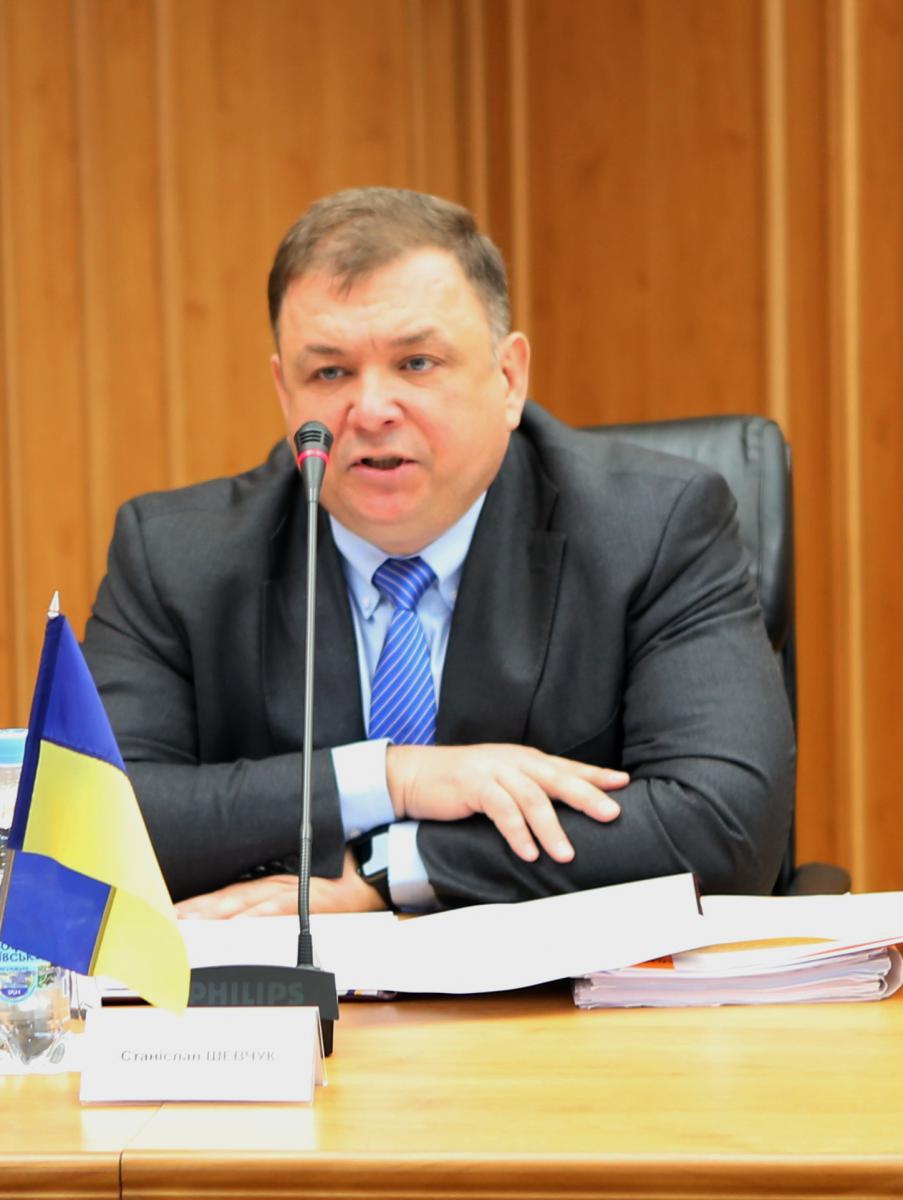 The results of the 7th Ukrainian-German expert talks on constitutional law and process were summed up by the judge of the Constitutional Court of Ukraine Ihor Slidenko. According to him, the practice of considering constitutional complaints in Ukraine is still at the stage of formation. "The Constitutional Court of Ukraine is building its own practice of considering constitutional complaints, taking into account international experience on this issue, in particular, Germany," the judge emphasised.
The results of the 7th Ukrainian-German expert talks on constitutional law and process were summed up by the judge of the Constitutional Court of Ukraine Ihor Slidenko. According to him, the practice of considering constitutional complaints in Ukraine is still at the stage of formation. "The Constitutional Court of Ukraine is building its own practice of considering constitutional complaints, taking into account international experience on this issue, in particular, Germany," the judge emphasised.
Ihor Slidenko noted that the practice of the Constitutional Court of Ukraine in considering constitutional complaints is at the stage of formation, and such meetings, in his opinion, are extremely useful. "The problematic issue allowed to find answers to a large number of topical issues of constitutional justice, as well as gave rise to new questions for further discussion," the judge pointed out.
The Chairman of the Constitutional Court of Ukraine Stanislav Shevchuk thanked the guests for the relations of confidence and mutual respect between the constitutional control bodies of Ukraine and Germany and expressed his hope for further fruitful cooperation.

